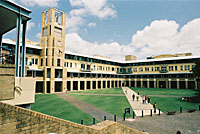|
||||||||||||||||||||||||||||||||||||||
| Adaptive Signal Processing in Telecommunications - TELE9345 | ||||||||||||||||||||||||||||||||||||||

Description The course is roughly in two halves. The first half covers adaptive signal processing and the second half concentrates on telecommunication applications. The adaptive signal processing material will cover a selection of topics from: algorithm construction (for both finite impulse response and infinite impulse response filters) such as LMS, EWLS, Kalman filter based algorithms and their derivatives; algorithm stability (including tracking analysis) and algorithm performance (including misadjustment). Background stochastic process material such as autocorrelations, autoregressive processes, spectra will also be included. The telecommunications component will focus in depth on applications such as equalization and mobile channel estimation, signal carrier and timing synchronization, adaptive multiuser detection in 3G mobile communication systems, adaptive CDMA RAKE receivers, adaptive or smart antennas in mobile communications. There will be a significant computational component to the course involving computer based simulation.
|
||||||||||||||||||||||||||||||||||||||


